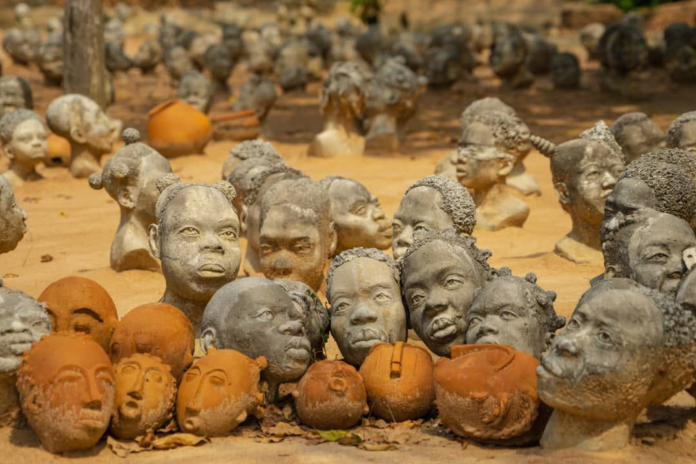The Akans, one of the largest and predominant ethnic groups in Ghana, have a rich history of documenting family portraits of the deceased through sculpture. This practice served as a significant commemoration of African ancestors until colonialism interfered with the art form.
Akans believe in the transition to the realm of ancestors after death, where life continues in another form. Ghanaian artist and educator Kwame Akoto-Bamfo is reviving interest in traditional African funerary practices through his art and educational initiatives.
Akoto-Bamfo gained public attention in 2015 with online campaigns and a large-scale installation in Cape Coast, Ghana. His work, known as “Nsiso,” was exhibited during Ghana’s 60th Independence celebration. In 2019, he established the Nkyinkyim Museum as part of his Ancestor Project, located outside Accra.
The museum serves as a space for people of African descent to engage in restorative healing through art and education. The annual Ancestor Veneration ceremony at the museum reflects the importance of African traditional funerary arts.
The museum’s Sacred Area features thousands of unique heads representing ancestors, with a goal of reaching 11,111 heads to symbolize strength and harmony. Akoto-Bamfo has expanded the ceremonies to include other African ethnic groups and African Americans in the diaspora.
The artist emphasizes the importance of traditional practices during these ceremonies, such as removing shoes, pouring libations, and respecting the sacred nature of the artworks.
The Nkyinkyim Museum’s impact extends beyond Ghana, attracting visitors like Judith Carroll, an African American woman who attended the Ancestor Veneration ceremony.
Akoto-Bamfo aims to destigmatize African traditions and promote healing through art and culture. His vision focuses on reclaiming African heritage from the legacies of colonialism and enslavement.
As a graduate of Kwame Nkrumah University of Science and Technology and a Fellow of Yale Directors Forum at Yale University, Akoto-Bamfo believes in the power of art and culture to heal the African continent and its people.
His efforts to promote traditional African funerary practices and educate others about the significance of ancestor veneration are reshaping perceptions of African heritage and celebrating the rich cultural traditions of the Akans and other ethnic groups.

